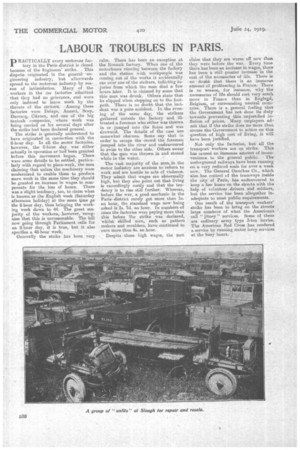LABOUR TROUBLES IN PARIS.
Page 36

If you've noticed an error in this article please click here to report it so we can fix it.
PRACTICALLY every motorcar factory in the Paris district is closed
because of the ?angineers' strike. This dispute originated in the general -engineering industry, but afterwards spread to the motorcar industry by reason of intimidation. Many of . the workers in the car factories admitted that they had no grievance, and were only induced to leave work by the threats of the strikers. Among these factories were Delage, Anzani, Scap, Darracq,Citroen, and one of the big taxicab companies, where work was being carried on for several days after the strike had been declared general.
The strike is generally understood to have originated in connection with the 8-hour day. In all the motor factories, however, the 8-bour day was either actually in operation or had been granted before this movement began. There were some details to be settled, particularly with regard to piece-work, the men claiming that unless the machinery were modernized to enable them to produce more work in the same time they should be granted an increase in wages to compensate for the loss of hours. There was a slight tendency, too, to claim what. is known as the English week (Saturday afternoon holiday) at the same time es the 8-hour day, thus bringing the working week down to 44. The great majority of the workers, however, recognize that this is unreasonable. The bill now going through Parliament calls for an 8-hour day, it is true, but it also specifies a 48-hour week.
Generally the strike has been very calm. There has been an exception at the Renault factory. When one of the motorbuses rtinning between the fackory and the station with workpeople was coming out of the works it accidentally ran over one of the strikers, inflicting injuries from which the man died a few hours later. It is claimed by some that this man was drunk. Others state that he slipped when stepping on to the footpath. There is no doubt that the incident was a pure accident. In the evening of the same day, the strikers gathered outside the factory and illtreated a foreman who either was thrown in or •jumped into the Seine and was drowned. The details of the case are somewhat obscure_ Some say that in order to escape the crowd the foreman jumped into the river and endeavoured to swim to the other side. Others swear that the man was thrown in and stoned while in the water.
The vast majority of the me.n,in the motor industry are anxious to return to work and are hostile to acts of violence. They admit that wages are abnormally high, but they also point out that living is exceedingly costly and that the tendency is to rise still further. Whereas, before the war, a good mechanic in the Paris • district rarely got more than 1s, an hour, the standard wage now being asked is 2s. 7d. an hour. In numbers of cases the factories were paying more than this before the strike was declared, whilst skilled men, such as pattern makers and moulders, have continued to earn more than 4s. an hour.
Despite these high wages, the men
claim that they are worse off now than they were before the war. Every time there has been an inefease in wages, there has been a still greater increase in the cost of the necessaries of life. There is no • doubt that there is an immense amount of profiteering in France. There is no reason, for instance, why the necessaries of life should cost very much more 111 France than in Englay,d, Belgium, or surrounding neutral countries. There is a general feeling that the Government has not done its duty towards preventing this unjustified inflation of prices. Many employers ad-' suit that if the strike does no more than arouse the Government to action on this question of high cost of living, it will. have been justified.
Not only the factories, but all the transport workers are on .strike. This has caused an immense amount of inconvenience to the general public. The underground railways have been running on a very reduced scale for ever a week Dow. The General Omnibus Co., which also has control of the tramways inside the city of Paris, has endeavoured to keep a few buses on the streets with tha help of volunteer drivers and soldiers, but the service has been altogether inadequate to meet public requirements.
One result of the transport workers' strike has been to bring on the streets large numbers of what the Americans call " jitney " services. Some of these are ordinary army type 3-ton lorries. The American Red "Cross has rendered a service by running motor lorry services at the busy hours.










































